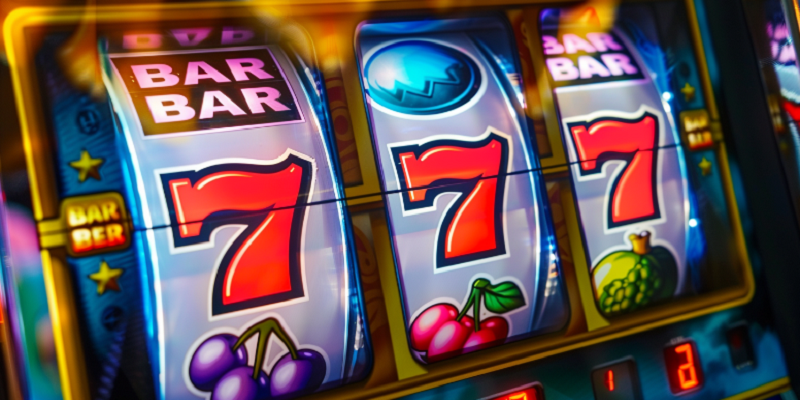Online slots are still the most popular casino game, even though they’ve come a long way from the classic mechanical machines. They might be more complex now, but they’re just as entertaining.
In this complete guide to online slots, we’ll cover how they work, which types offer the highest payouts, what kinds of features and symbols to look out for, and how to manage your bankroll while playing.
How do online slots work?
Online slot machines are actually pretty straightforward. They still follow the same basic idea as the original design created by Charles Fey in the late 19th century. You choose your stake and spin the digital reels.
If the symbols line up in a winning combination—usually several matching symbols on a payline—you win a payout based on your bet and the symbols that appear. If not, you lose your stake and can spin again.
Early slot machines used mechanical reels, but today’s online versions rely on computer software and Random Number Generators (RNGs) to determine the results. Every licensed game provider must meet strict regulations to ensure fair payout rates. We’ll explain exactly how RNGs work in online slots later in this guide.
Random Number Generator
Most online slots still use 3 or 5 reels to produce results, even though it’s now computer software—not physical mechanics—deciding what appears on the screen. While the visuals have evolved, the basic math behind the outcomes remains largely unchanged. Later in this guide, we’ll also cover Megaways slots, which break away from the standard reel setup.
One thing all modern online slots have in common is that every spin is determined by a Random Number Generator (RNG). This software ensures that each round is fair and that every player has the same chance of winning.
How does the RNG make the results of a slot machine truly random?
The Random Number Generator (RNG) is what makes the outcome of every slot spin truly random. It generates a number that tells the game exactly when the reels should stop. Based on where the reels land, the system calculates any payout the player is due, and the result is displayed instantly. If you activate turbo or quick spin mode, this whole process happens in just a couple of seconds.
Luck is the key factor in online slots. There’s no strategy you can use to boost your odds—each spin is completely independent of the one before it, much like flipping a coin. Because of this randomness, every round delivers a fresh and unpredictable result.
Myths about online slot machines
There are many common misconceptions about online slot machines. In this part of our complete guide to online slots for beginners, we’ll explain why these myths aren’t true.
One of the oldest and most widespread myths is that online slots stop paying out after a big win—or that they’re more likely to pay out if no one has hit a jackpot for a while. This simply isn’t true. As we’ve already mentioned, each spin is completely random and independent of the last. It’s entirely possible for a slot to hit a big win twice in a row—or not at all for a while.
Another popular idea is that online slots go through “hot and cold streaks”—paying out frequently for a short time and then going quiet. Again, this is a myth. The outcome of every spin is determined by the Random Number Generator, which guarantees that each round is unique and unaffected by previous results.
Finally, some people believe there’s nothing you can do to improve your chances of winning. That’s not entirely true. While you can’t influence the outcome of a spin, you can make smarter choices—like picking slot games with a high RTP (Return to Player). We’ll explain what RTP means and how it works in one of the next sections.
The volatility and RTP of online slots
The exact payout of an online slot depends on two key factors: volatility and return to player (RTP). These factors not only influence how much you can win, but also how often you’ll win and your overall chances of success in the long run.
Theoretical Return to Player (RTP)
RTP represents the percentage of money that a slot machine is expected to pay out over time. Most online slots have an RTP of around 96%. For example, if you bet €100 on a slot with a 96% RTP, you can expect to win €96 back in the long run.
This means the house edge on slot machines is roughly 4% per spin. When compared to other casino games, this edge is slightly larger. For instance, roulette has an RTP of about 97.3%, while blackjack offers an RTP of around 99.5%. While many slots pay out around 96%, there are some that pay more—and some that pay less, particularly those with larger jackpots.
Volatility or Variance
Volatility (or variance) refers to how frequently a slot pays out and how much it pays when it does. Slots can be categorized into three volatility levels: low, medium, and high.
- Low volatility slots pay out more frequently, but the amounts tend to be smaller. These are ideal for players who prefer consistent wins, especially if you’re using casino bonuses or freebies.
- High volatility slots pay out less often, but when they do, the wins are typically much larger. These are suited to players who are in it for the long haul and are aiming for bigger, more exciting wins.
So, if you’re looking for steady payouts, low volatility slots are your best bet. But if you’re after bigger, rarer wins, high volatility slots might be more your style.
How do you play online slot machines?
Playing online slots is simpler than games like roulette, blackjack, baccarat, or poker. You don’t need any specific strategy—just choose your bet, click “spin,” and wait for the result.
However, if you’ve never played online slots before, getting started can feel a bit overwhelming. To make things easier, we’ll guide you through the process step-by-step.
Create Your Online Gaming Account
Before you can play real-money online slots, you’ll need to create an account at a legal online casino such as WantedWin. Luckily, this is usually quick and easy. Simply visit the casino’s website, click “Sign Up,” and fill in the requested details. You’ll typically need to verify your identity during this process, so have a valid ID on hand, such as a passport, driver’s license, or national ID card.
Deposit Funds into Your Account
Once your account is set up, you’ll need to add funds to play real-money slots. Most casinos offer a range of payment options to make this step easy. iDEAL, credit cards like Visa or MasterCard, and e-wallets such as PayPal, Neteller, and Skrill are commonly accepted.
To make a deposit, visit the casino’s “Cashier” or payment page. Select your preferred method, enter the deposit amount, and follow the on-screen instructions to complete the transaction.
Choose Your Slot Game
After funding your account, head to the game lobby. This is the heart of the casino site where you can browse and select a game. The lobby often allows you to filter or search for slots by type, theme, or game provider. Once you’ve found a game you like, click on it to start.
Set Your Bet
Once you’ve selected a slot, you’ll see the game’s interface. The betting options are usually displayed below the reels. Here, you can adjust the amount you’re betting per spin, as well as how much you want to wager on each payline (if applicable). Most slots let you choose the total bet for the round, while others allow you to adjust the bet per payline. Use the arrow buttons or sliders to increase or decrease your wager.
Spin the Reels
After setting your bet, it’s time to spin! Just hit the “Spin” button to get the reels turning. Unlike some other online casino games, legal online casinos don’t allow autoplay for slots, so you’ll need to manually press spin each time you want to play a round.
If you’re looking to speed things up, many online slots offer a “Turbo” or “Quick Spin” feature. This lets you skip the animations or speed up the reel spins, so you can quickly see the outcome of each round.
How Do Online Slots Work – Paylines?
Paylines are the lines that run across the reels in a slot game, determining where matching symbols need to land to form a winning combination. In classic slot machines, there was usually just one payline running straight through the center of the reels. However, most modern online slots feature multiple paylines—typically 10 or 20 lines—that give players more ways to win.
To win, you generally need at least three matching symbols to appear on one or more of these paylines. Usually, only the payline with the highest payout will award you winnings, but in some games, you can win from multiple paylines in a single spin.
In many modern slots, you must bet on all available paylines every time you play. However, some slot machines allow you to choose how many paylines you want to activate for each spin. If you’re unsure about how the paylines work for a particular game, you can click on the “i” button in the game interface to view the paytable and understand the specific rules for that slot.









